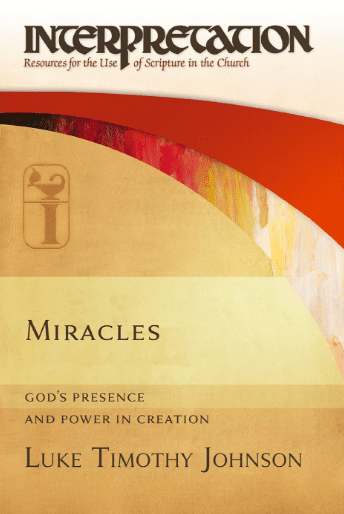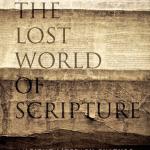 Are miracles a take ’em or leave ’em element of the Christian faith? This is the question asked early by Luke Timothy Johnson in his new book, Miracles: God’s Presence and Power in Creation. Here are few choice claims:
Are miracles a take ’em or leave ’em element of the Christian faith? This is the question asked early by Luke Timothy Johnson in his new book, Miracles: God’s Presence and Power in Creation. Here are few choice claims:
If it is impossible for God’s Word to be visibly present in the world today, for example, then neither can the Word have been made flesh in the person of Jesus, and any talk about the incarnation becomes nonsense (Hick 1977). If Jesus is not raised from the dead and exalted to God’s right hand, to become the life-giving Spirit that transforms the lives of believers, then, as Paul declares, Christian faith is empty and hope of a future resurrection is foolish (1 Cor. 15:19).
The forms of Christianity that suppress or deny the miraculous are consequently deracinated, cut off not only from the testimony of Scripture, but also from the creed and from centuries of living testimony given by the saints. Small wonder that Christianity so defined sometimes appears to be little more than a place for moral uplift and social improvement, lacking both a firm grasp on the good news of Scripture and a generous vision of God’s power in the present. Having staked its future on a form of rationality that increasingly seems inadequate to life’s genuine mysteries, such Christianity drifts, passionless and pointless, sustained mainly by institutional inertia and residual loyalty among its adherents.
The Christian faith stares in the faces of Spinoza, Kant, and Hume.
Three elements of Hume’s discussion, however, have become standard. The first is his barely concealed contempt for those who believe in miracles. Only the ignorant or the befuddled can be gulled by miraculous claims; thus such claims do not occur among Hume’s enlightened neighbors, only among those who lived in the dark ages or dwell in benighted lands. The second element is Hume’s definition of miracles as having to do with individual acts in which an appeal to an unseen agency breaks or violates the established laws of nature. The third element is Hume’s contention that such laws of nature are constant and universally acknowledged (by the knowledgeable), in contrast to the scattered witnesses claiming signs and wonders, whose credibility is always to be suspect precisely because their claims contradict how everyone knows the world works.
In other words, the Christian faith stares in the face of secularization. Which means it stares in the face of the descriptions of Charles Taylor, who unfortunately is not even cited in Johnson’s book on miracles.
And precisely the degree to which the standards of the secular world (thus construed) have infiltrated the church, Christians find themselves in a condition of cognitive dissonance when it comes to miracles. From one side, they are pressed by the claims of Scripture and tradition concerning the work of the living God in the world; from every other side, they are pressed even more powerfully by the cultural assumptions of the world in which they live, assumptions that make the miraculous a problematic category.
Secularity creates double-mindedness among Christians: a faith that affirms miracles and life that doesn’t know them. Johnson sees liberation theology as a capitulation to secularity in its belief that God’s action is restricted to social activists/activism (29-30). Pastors fall into the same trap in pastoral ministry and in preaching.
Johnson finds challenges to acquire a single-mindedness.
First, laws of nature.
The notion that God is constrained to act in accordance with human observations concerning ordinary patterns of occurrence is, once one thinks about it, ludicrous, as is the precipitous and arrogant conclusion that an event outside the ordinarily observed pattern of occurrence is a “violation” of a pattern that exists only in the order of human cognition, not in the things observed.
And he provides examples of how “what everyone knows” is not what everyone knows.
Second, individual act. The concentration on individual acts as miracles leads to believing other acts are non-attended by God or not part of God’s presence.
Third, concept of nature. Again, by definition God is ruled out of “nature” so that what we experience in nature is not an experience of God. Emergence theory itself should lead us to think of nature as far more complex than God vs. nature, the supernatural vs the natural.
Fourth, literalistic readings. Historical critical readings of Scripture are reductionistic and rule out God.
Johnson contends the whole discussion needs to be reframed. Next chapter.











